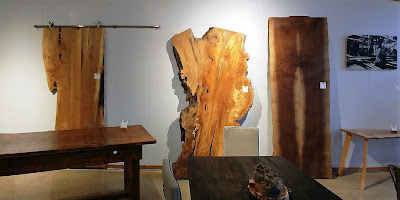Urban Lumber Co. of Springfield is an excellent case in point. Owner Seth San Filippo founded Urban Lumber Co. in 2006. He viewed the stewardship of our urban forest as his mission and growing the awareness of the value of salvaged city street trees as the means for fulfilling that vision. He did this by building a company dedicated to repurposing salvaged wood into bespoke pieces of fine furniture and décor. Seth’s belief in environmental responsibility, his fundamental love of beautiful woods, and his appreciation of the trees they come from have fueled his success and that of Urban Lumber since its beginning.
Along with several of my Robertson/Sherwood/Architects colleagues, I recently enjoyed the pleasure of meeting Seth and visiting Urban Lumber’s facility located in the former Booth Kelly Lumber Company mill (now the Booth Kelly Makers District) adjacent to Springfield’s historic downtown. In addition to Seth, showroom manager/designer Becky Rothweiler and director of sales Sheri Wayt welcomed us warmly and led our small group on a private tour of the company’s operations.
RSA tour of Urban Lumber Co. (from left to right: Andy Drake, Jenni Rogers, and Scott Stolarczyk of RSA; Becky Rothweiler, Seth San Filippo, and Sheri Wayt of Urban Lumber)
We were immediately impressed by the size of Urban Lumber’s milling and storage area, which occupies 30,000 square feet of contiguous space. Countless slabs of various wood species were carefully stacked throughout for drying. Other conspicuously large, unmilled sections of salvaged trees sat about awaiting their turn for transformation into fine handcrafted pieces. We looked at various saws and planers, an eclectic mix of vintage and state-of-the-art equipment. These include one of the largest custom-built saws in the country, which allows Urban Lumber to cut slabs up to six feet wide directly from intact logs as much as 35 feet in length. The best cuts possible enhance the character of each log.
The large mill saw (a band saw type raised and lowered between the two blue posts)
The two kilns. Note the stack of slabs cut from a single large log on the right.
The devastating January 2017 ice storm claimed many notable specimens but provided Urban Lumber with a valuable bounty that might otherwise have been destined for landfills. Another source is from buildings razed to make room for new developments. Urban Lumber gives this salvaged lumber new life, through means that can recall and extend a memory of the structures from which the material originated.
Seth said the urban forests of Eugene and Springfield support trees that can grow much larger than their nature-dwelling counterparts, which often must compete for access to sunlight and other resources. The variety of native species Urban Lumber uses is remarkable. This variety includes familiar Oregon woods such as Douglas fir, hemlock, Western red cedar, and Oregon white oak, but also an abundance of black walnut, maple, elm, myrtlewood, and other hardwoods. The distinctive character of every species, and the individuality of each tree comprises a singular legacy and story about our urban forest.
A variety of slabs cut from different trees.
Showroom display
You can see the company’s handiwork in many places. Restaurants, breweries, and tap houses find the rustic quality of reclaimed lumber fits the bill when quirky charm and character are the order of the day. Hotels, corporate offices, and many other venues have likewise been attracted to Urban Lumber’s offerings. Urban Lumber’s local clientele include Blu Mist Restaurant & Bar, Oakshire Brewing, the University of Oregon, Springfield School District, Northwest Community Credit Union, and The Hub. The company also takes pride in sharing the inherent natural beauty of our Pacific Northwest lumber with a growing global customer base.
Speaking of growth, Seth reported his business has grown by 30% annually; this includes during the Great Recession that was a backdrop to the company’s early years. Urban Lumber produced 770 pieces in 2017, an unquestionably impressive number considering the handcrafted nature of so much of its work. Urban Lumber’s success is good news for Springfield, and particularly fitting given the city’s long wood products history.
Urban Lumber Co. is literally a homegrown company, one that has quickly become a leader among custom furniture makers in the nation. I’m happy a local enterprise is making a difference in Springfield, contributing to the city’s ongoing renaissance by working proactively toward sustainability, economic diversity, and urban rejuvenation.






No comments:
Post a Comment